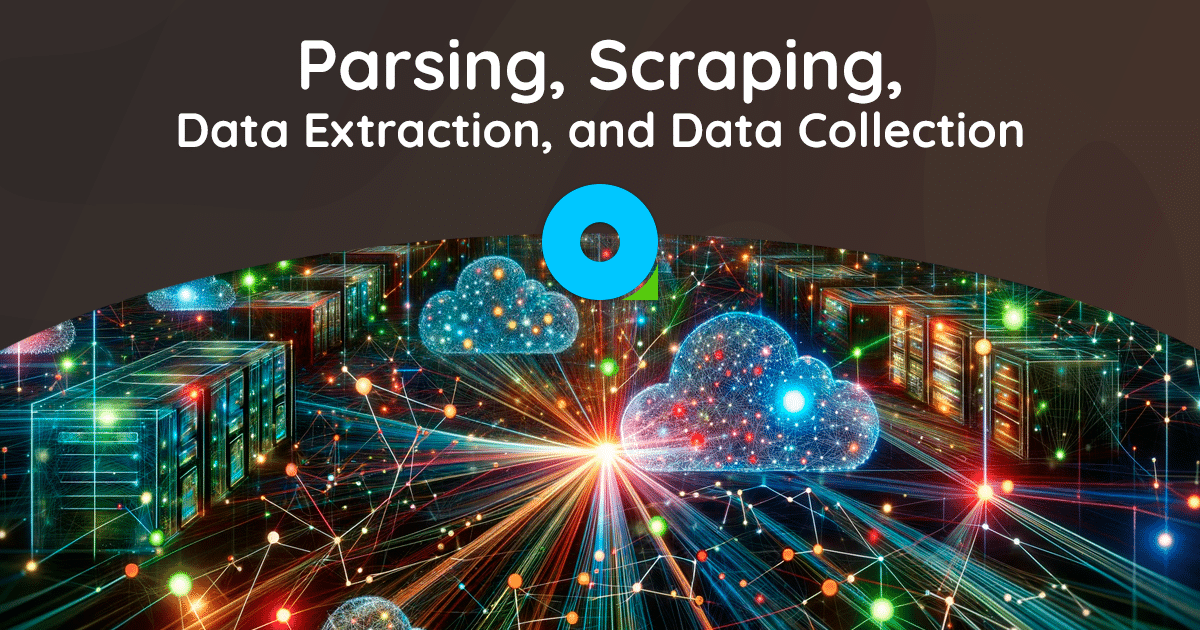
Parsing, scraping, data extraction, and data collection are distinct yet interconnected processes essential for effective data management. Understanding their differences and applications is crucial for efficiently handling and utilizing data from various sources. Each process has specific purposes, methodologies, and applications that contribute to efficient data handling.
Scraping
Scraping, or web scraping, involves the automated retrieval of data from websites. This process uses bots or scripts to extract large volumes of information that is publicly accessible but not easily downloadable. The primary objective is to gather data efficiently, often for competitive analysis, market research, or aggregation services.
Applications:
- Price Monitoring: E-commerce companies frequently use scraping to track competitor pricing, allowing them to adjust their own prices dynamically.
- Market Research: Researchers and analysts scrape social media, forums, and review sites to gauge public sentiment and identify market trends.
- News Aggregation: News organizations use scraping to compile articles from various sources, providing comprehensive coverage on specific topics.
Tools and Technologies: Common tools for web scraping include programming languages like Python, with libraries such as Beautiful Soup and Scrapy, and dedicated software like Octoparse and ParseHub.
Role of Proxy Servers: Using proxy servers in scraping operations is crucial for maintaining anonymity, avoiding IP bans, and managing request rates. Proxies distribute requests across multiple IP addresses, preventing detection and ensuring continuous access to target websites. OneProxy offers robust and high-speed datacenter proxy servers that are ideal for such tasks, ensuring smooth and uninterrupted scraping activities.
Parsing
Parsing is the process of analyzing and converting a string of data into a structured format. It involves breaking down data into smaller, manageable components for easier handling and understanding. Parsing is a critical step in data processing, especially after data is scraped or extracted.
Applications:
- Data Cleaning: Formatting and sanitizing data retrieved from various sources to ensure consistency and accuracy.
- Text Analysis: Decomposing sentences into words or phrases for natural language processing and sentiment analysis.
- XML/JSON Parsing: Converting data from these structured formats into a usable form for further analysis or storage.
Tools and Technologies: Programming languages like Python (using libraries such as lxml and json) and JavaScript are commonly used for parsing tasks.
Role of Proxy Servers: Proxies play a lesser role directly in parsing but are essential in the preceding steps of data scraping and extraction, ensuring the data obtained for parsing is comprehensive and accurate. By using OneProxy’s services, you can guarantee the reliability of the data collection process, which in turn simplifies parsing operations.
Data Extraction
Data extraction involves retrieving specific data from a variety of sources, including structured databases, unstructured documents, or semi-structured web pages. The aim is to selectively pull out pertinent information for further processing, analysis, or storage.
Applications:
- Database Migration: Extracting data from legacy systems to transfer into modern databases.
- Business Intelligence: Extracting relevant data for generating reports and insights.
- Data Warehousing: Collecting data from multiple sources to store in a centralized data warehouse for analysis.
Tools and Technologies: ETL (Extract, Transform, Load) tools such as Talend, Apache Nifi, and Informatica, along with SQL and Python, are widely used for data extraction.
Role of Proxy Servers: Proxies are instrumental in data extraction, particularly when accessing multiple sources or large datasets. They help in distributing the load, avoiding IP blocking, and maintaining access continuity. OneProxy’s datacenter proxies are well-suited for such tasks, providing high-speed and reliable connections for extensive data extraction needs.
Data Collection
Data collection is the broad process of gathering data from various sources. This can be achieved through both automated and manual methods and forms the first step in the data lifecycle. The objective is to accumulate data for analysis, decision-making, or research purposes.
Applications:
- Survey Research: Collecting responses from surveys and questionnaires.
- Sensor Data: Gathering readings from IoT devices and sensors.
- Log Data: Compiling logs from servers and applications for monitoring and analysis.
Tools and Technologies: Survey tools like SurveyMonkey and Google Forms, IoT platforms such as AWS IoT and Google Cloud IoT, and log management tools like Splunk and ELK Stack are commonly used.
Role of Proxy Servers: Proxy servers enhance data collection by ensuring secure and anonymous data gathering, particularly from online sources. They help in bypassing geo-restrictions, managing data requests efficiently, and protecting against IP bans. OneProxy’s services provide a reliable and scalable solution for diverse data collection needs.
Leveraging Proxy Servers from OneProxy
Proxy servers are indispensable in ensuring the success of data operations. Here are some ways OneProxy’s services can be utilized:
- Anonymity and Security: Proxies mask your IP address, ensuring anonymity and protecting your identity during data scraping and collection.
- Bypassing Restrictions: Access geo-restricted content and bypass IP blocks, ensuring uninterrupted access to required data.
- Load Distribution: Distribute data requests across multiple IP addresses to avoid detection and manage request rates efficiently.
- High Speed and Reliability: OneProxy’s datacenter proxies offer high-speed connections and reliable performance, crucial for large-scale data operations.
- Scalability: Easily scale your data operations with OneProxy’s extensive IP pool, accommodating increasing data needs without compromising performance.
Conclusion
Understanding the distinctions between scraping, parsing, data extraction, and data collection is fundamental for efficient data management. Proxy servers, especially those offered by OneProxy, play a critical role in enhancing these processes. By ensuring anonymity, security, and reliability, proxies facilitate seamless data operations, enabling businesses to harness the full potential of their data resources. Whether you are monitoring prices, conducting market research, or collecting data for analysis, OneProxy’s services provide the robust infrastructure needed for successful data endeavors.





